
The Ferry Boat Inn was a public house and 150-capacity live music venue in Norwich, England, which closed in 2006.

The Ferry Boat Inn was a public house and 150-capacity live music venue in Norwich, England, which closed in 2006.
The history of the Ferry Boat has been traced as far back as 1822, when it is thought to have been called the Horse Packet. It was known as the Steam Barge by 1830, and in 1867 its name was changed to the Steam Packet. It was first known as the Ferry Boat in 1925.
In the mid 1970s a second bar was opened in a converted boat shed at the rear of the pub. It was here that the pub began putting on live music. The Ferry Boat was originally a venue for cover bands, but in the late 1990s local promoters began booking their own nights at the venue to put on local originals bands, and touring bands from all over the world. Over the next few years the Ferry Boat became established as one of the most important venues for local bands, catering for all types of alternative music, with a leaning towards punk rock, ska punk, metal, hardcore and Post-rock.
The serial killer Steve Wright was landlord of the pub in 1988. [1] [2]
In 2005 a protest was held after the Ferry Boat faced losing its public entertainment licence due to noise complaints from residents of a newly built block of flats nearby. The protest was a success, and the Ferry Boat's licence was renewed. However the Ferry Boat was forced to close a year later in 2006 due to continued noise complaints and financial difficulty. The final gig was an all-day-long event featuring local bands with Norwich based five-piece Dragline closing the night to a sweaty room packed to full capacity. [3]
The Ferry Boat Inn is currently closed. In January 2010, the site was sold to the Borthwick family, who received planning permission to build Norwich Backpackers on the site.[ citation needed ] The development would include a micro pub as part of the building, along with a cafe overlooking the river and a cycle and canoe storage barn.
In June 2014, it was reported that the Ferry Boat Inn had been sold for "more than £500,000", and that it might be turned into a residential development. A representative for the estate agents that handled the sale stated that it would not be a backpackers' site and that the new owners would "probably be looking for other, denser uses for the site". [4]
In 2019, the site was put up for sale again, [2] and bought by property development company Estateducation for £1.2 million. In October 2020, work began to build 41 homes on the site, comprising 2 in the former pub building and 39 in a five-storey tower in the car park. [5] Building works stopped in January 2022 after, according to Companies House, the main contractor, Devise Construction Ltd, was forced into receivership due to failure to pay back a Coronavirus Business Interruption loan. [6] Progress was hampered further in July 2024 when the development company went into receivership
The Ferry Boat's regular presence on tour schedules meant that many bands would pass through it before moving onto greater acclaim. Examples of bands and artists to have played the venue include:
Other notable bands include: [ citation needed ]
RX Bandits, The Aquabats, Minus the Bear, Noisettes, Bleeding Through, Brigade, Anti-Nowhere League, UK Subs, Demented Are Go, Throwdown, The Vibrators, Twin Zero, The Business, Captain Everything!, The Red Chord, HORSE the band, Bullet Union, Eden Maine, Fastlane, The Littlest Man Band, Seachange, Hoover, Even in Blackouts, Stretch Arm Strong, Jeniferever, Kid commando, The Dangerfields, Logh, The Good Life, Vanilla Sky, Modern Life Is War, Howards Alias, MU330, Stza Crack, Send More Paramedics, Strike Anywhere, The Robocop Kraus, Decibully, Chris T-T, Swearing at Motorists, The Martini Henry Rifles, Miss Black America, Melys, Engerica, Kinesis, KaitO, Meanwhile, Back In Communist Russia..., Sputniks Down, The Dawn Parade, Bearsuit, Angelspit, The Suffrajets, The Microphones, Karl Blau, Magoo, Herman Düne, We vs. Death, Koufax, Funeral Diner, Days in December, Jairus, Leatherface, Champion, The Juliana Theory, Koopa.

A pub is in several countries a drinking establishment licensed to serve alcoholic drinks for consumption on the premises. The term first appeared in England in the late 17th century, to differentiate private houses from those open to the public as alehouses, taverns and inns. Today, there is no strict definition, but the Campaign for Real Ale (CAMRA) states a pub has four characteristics:

Horning is an ancient village and parish in the English county of Norfolk. It covers an area of 11 km2 and had a population of approximately 1,100 in the 2021 census. Horning parish lies on the northern bank of the River Bure south of the River Thurne and is located in The Broads National Park. For the purposes of local government, it falls within the district of North Norfolk, although areas alongside the rivers and broads fall into the executive area of the Broads Authority.
Pub rock is a subgenre of rock music that emerged in the early to mid-1970s in the United Kingdom. A back-to-basics movement, which incorporated roots rock, pub rock was a reaction against the expensively-recorded and produced progressive rock and flashy glam rock scenes at the time. Although short-lived, pub rock was played live in small traditional venues like pubs and clubs. Since major labels showed no interest in pub rock groups, pub bands sought out independent record labels such as Stiff Records. Indie labels used relatively inexpensive recording processes, so they had a much lower break-even point for a record than a major label.

Harborplace is a shopping and dining complex on the Inner Harbor in Baltimore, Maryland.

Bellerive is a suburb of the City of Clarence, part of the greater Hobart area, Tasmania, Australia. It stretches from Kangaroo Bay, bordering Rosny Park, along the shoreline of Bellerive Esplanade to Kangaroo Bluff, then to Bellerive Beach, and east to Second Bluff where Bellerive meets Howrah. To the north, Bellerive is bordered by the foothills of Waverly Flora Park.

Pub names are used to identify and differentiate traditional drinking establishments. Many pubs are centuries old, and were named at a time when most of their customers were illiterate, but could recognise pub signs. The use of signage was not confined to drinking establishments. British pubs may be named after and depict anything from everyday objects, to sovereigns, aristocrats and landowners. Other names come from historic events, livery companies, occupations, sports, and craftsmen's guilds. One of the most common pub names is the Red Lion. This list contains both modern and historical examples.
Whitbread is a British multinational hotel and restaurant company headquartered in Houghton Regis, England. The business was founded as a brewery in 1742 by Samuel Whitbread in partnership with Godfrey and Thomas Shewell, with premises in London at the junction of Old Street and Upper Whitecross Street, along with a brewery in Brick Lane, Spitalfields. Samuel Whitbread bought out his partners, expanding into porter production with the purchase of a brewery in Chiswell Street, and the company had become the largest brewery in the world by the 1780s.
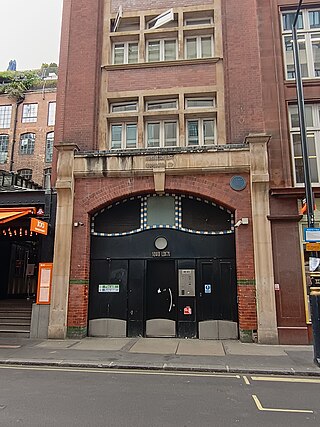
The Marquee Club was a music venue in London, England, which opened in 1958 with a range of jazz and skiffle acts. It was a small and relatively cheap club, in the heart of London's West End.
Holywell is a village in Cambridgeshire, England, approximately 6 miles (10 km) east of Huntingdon, in the civil parish of Holywell-cum-Needingworth. It is situated within Huntingdonshire, a non-metropolitan district of Cambridgeshire, and is a historic county of England.

Bigwin Island is an island in the municipality of Lake of Bays, District Municipality of Muskoka in Central Ontario, Canada. It the largest island on Lake of Bays.
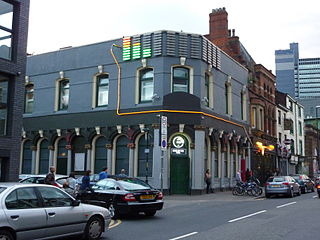
Band on the Wall is a live music venue in the Northern Quarter of Manchester, England.
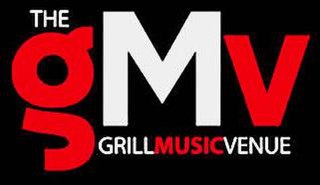
The Grill Music Venue, also known as The Grill, formerly The Golden Grill, was a nightclub located in Letterkenny, County Donegal, in Ulster, Ireland. Regarded as the unofficial Fianna Fáil headquarters, it has hosted Fianna Fáil party conventions and bingo sessions over the years. The complex housed six bars.
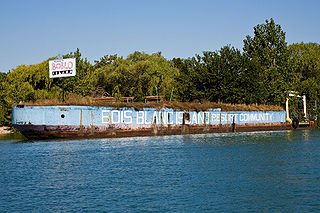
Boblo Island Amusement Park was an amusement park which operated from June 18, 1898, until its closure on September 30, 1993. Its amusement rides were sold in 1994.

The Tote is a live music venue, pub and former hotel located in Collingwood, Melbourne, Australia. The venue hosts many independent local, Australian and international acts, and carries a reputation for showcasing new and emerging independent musical acts of a variety of stylistic origins, having done so since the 1980s. The venue operates 5 days a week with performances across 3 settings, the "main stage", the "cobra bar" and the "front bar". It is located at 67-71 Johnston Street.
The Tuckies is a hamlet in the eastern part of Jackfield, lying on the south bank of the River Severn, in the Ironbridge Gorge, and opposite the village of Coalport. The purpose of this article is to capture its historical importance during the industrial revolution and provide links to the people and culture that once thrived here. The lower part of The Tuckies, in Ferry Road, is still badly affected by flooding and head-height water levels are clearly displayed in a doorway at The Boat Inn where the 1922 memorial footbridge crosses the River Severn to Coalport. The Severn Valley railway, operated by GWR, ran through The Tuckies and the original railway bridge, now forming part of the Severn Valley Way, still crosses the road there, at OS grid reference 693024.

The Bull & Gate is a Grade II listed public house and former music venue at 389 Kentish Town Road, Kentish Town, London. The pub had a long history as music venue, with bands such as The Pogues, Coldplay, Blur, and Suede playing there towards the start of their careers.

The Hobbit is a pub in the Bevois Valley area of Southampton, England. Previously the Portswood Hotel, it was named after J. R. R. Tolkien's book The Hobbit in 1989. In 2012 the pub was involved in a legal dispute with Middle-earth Enterprises, a company owned by film producer Saul Zaentz, over its use of the name.
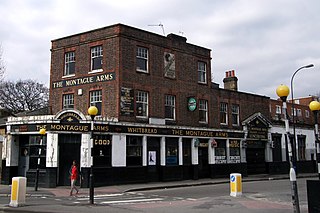
The Montague Arms was a music venue located at 289 Queens Road, in the Telegraph Hill ward of Lewisham, on the borders of Peckham and New Cross in south-east London from 1967 until 2018. The pub venue was known for its eccentric decor; which at some point included old fishing-boat lights, a 19th Century carriage containing a stuffed zebra, and an old diving suit.
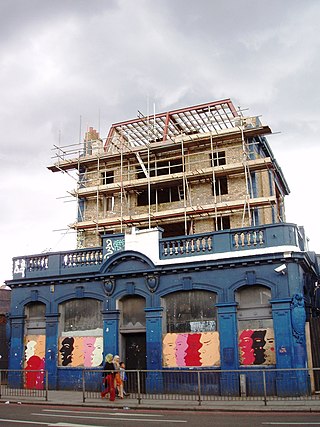
The Sir George Robey was a mid-19th century public house and later a music venue on Seven Sisters Road, Finsbury Park, North London, England. It was named in honour of the music hall performer Sir George Robey (1869–1954) in 1968.
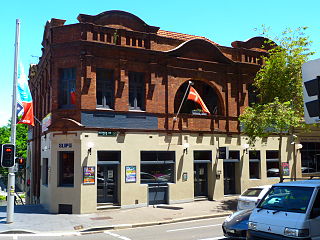
The Royal George Hotel is a heritage-listed pub located at 115–117 Sussex Street, Sydney, Australia. It was built in 1903. The adjoining former Cuthbert's Patent Slip building, assumed to date from 1869 and also heritage-listed, has also been incorporated into the hotel complex in recent decades. The hotel now operates as the Slip Inn.